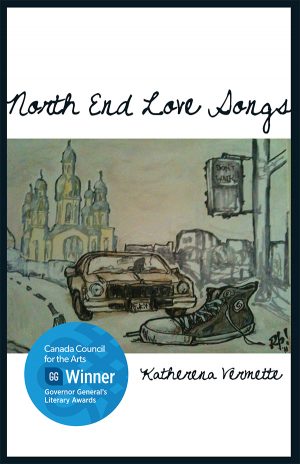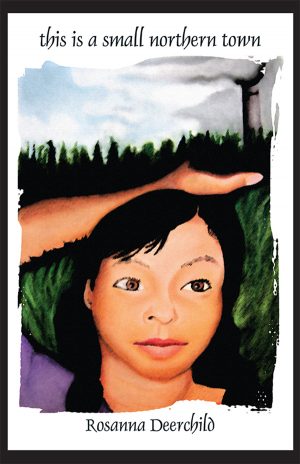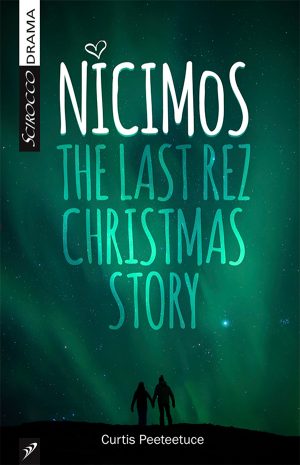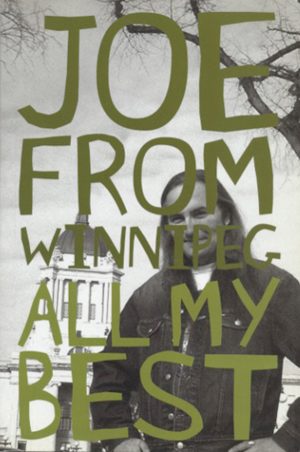Posted June 30, 2020
National Indigenous History Month Reading List
June might be coming to an end, but that doesn’t mean your Indigenous History Month reading should. Here are some suggestions for your reading list.
If poetry’s your jam, check these out:
North End Love Songs by Katherena Vermette
For Katherena Vermette, Winnipeg’s North End is a neighbourhood of colourful birds, stately elms, and always wily rivers. It is where a brother’s disappearance is trivialized by local media and police because he is young and aboriginal. It is also where young girls share secrets, movies, cigarettes, Big Gulps and stories of love—where a young mother full of both maternal trepidation and joy watches her small daughters as they play in the park. Winner of the Governor General’s Award for Poetry.
This Is a Small Northern Town by Rosanna Deerchild
Winner of the Aqua Books Lansdowne Prize for Poetry. This is a small northern town is Rosanna Deerchild’s first full-length collection of poems. These are poems about what it means to be from the north; a town divided along colour lines; and a family dealing with its history of secrets. At its core, this collection is about the life of a Cree girl and the places she finds comfort and escape. “What this northern girl pulls to the surface, kicking and screaming, is nothing less than magic. Like the mining town of her childhood, these poems blast away our innermost vulnerability, making way for love and light. But there is nothing shattered here—there is simply a dangerous girl the colour of gold. Stunning!” —Gregory Scofield.
If you want some drama in your life, try these:
-
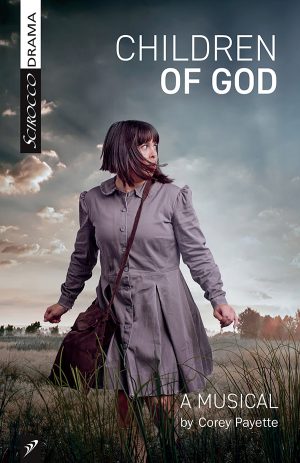 Children of God Paperback$15.95
Children of God Paperback$15.95
Children of God by Corey Payette
Children of God is a powerful musical about an Oji-Cree family whose children are taken away to a residential school in Northern Ontario. Julia and Tommy struggle to survive in the harsh environment of a religious school that is determined to rob them of their identities while their mother, Rita, never stops trying to get them back. The impact of this experience on the lives of all of them is profound and devastating, yet the story moves toward redemption. Children of God offers a thrilling blend of ancient traditions and contemporary realities, celebrating resilience and the power of the Indigenous cultural spirit.
-
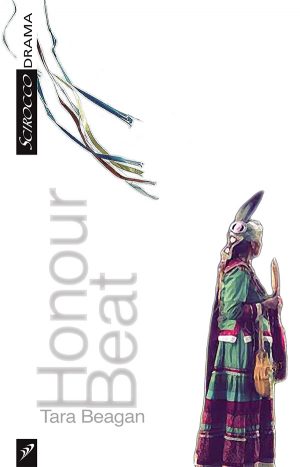 Honour Beat Paperback$15.95
Honour Beat Paperback$15.95
Two grown sisters face off over their mother’s deathbed. Together they confront one another, their own identities, and what will remain when their mom leaves this world. A contemporary look at the significance of faith and family, Honour Beat explores the stories this Indigenous family has told itself through the years, as their mother’s youthful spirit leads them toward forgiveness. Winner of the Gwen Pharis Ringwood Award for Drama.
-
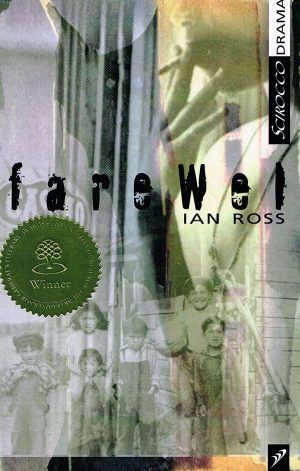 fareWel Paperback$14.95
fareWel Paperback$14.95
fareWel by Ian Ross
Life is tense on the Partridge Crop Reserve. The Chief is in Las Vegas (again), the band is in receivership, and there’s a move on to unilaterally declare self-government. And now that the welfare cheques have gone missing, the people of this fictional First Nation are forced to take control of their lives. fareWel is a raw and funny look at a group of ordinary people tackling some extraordinarily big issues. Winner of the Governor General’s Award for Drama.
-
 Cafe Daughter$9.99 – $15.95
Cafe Daughter$9.99 – $15.95
Café Daughter by Kenneth T. Williams
Café Daughter is a one-woman drama inspired by a true story about a Chinese-Cree girl growing up in Saskatchewan in the 1950s and 60s. The story begins in 1957, as nine-year-old Yvette Wong helps out in her parents’ café in Alistair, Saskatchewan. She’s incredibly bright but has been placed in the slow learners’ class because of her skin colour. Her mother Katherine, who was forced to attend a residential school, is conflicted about her identity and has charged Yvette with a secret—to never tell anyone she’s part Cree. Yvette has dreams that her mother nourishes, but when Katherine dies and Yvette and her father move to Saskatoon, Yvette must try to pursue her dreams alone, carving a path uniquely her own.
-
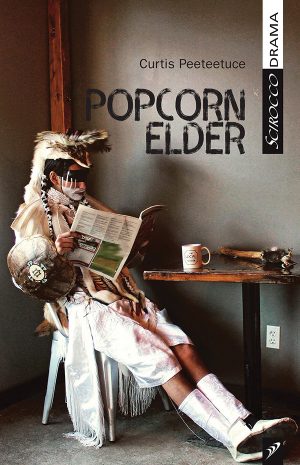 Popcorn Elder Paperback$15.95
Popcorn Elder Paperback$15.95
Popcorn Elder by Curtis Peeteetuce
As a condition of his parole, Darren has been ordered by the court to live with his father, Wally, on the rez. The two have always had a contentious relationship: Wally is a problem drinker, and Darren’s got a short fuse. But Wally tells his son that he’s stopped drinking and started going to ceremony, and urges Darren to do the same. As old family secrets start to be revealed, the father and son grapple with complex issues. Through flashbacks, a combination of Cree and English, and an unforgettable cast of characters, Popcorn Elder tells the story of one family’s journey toward hope.
-
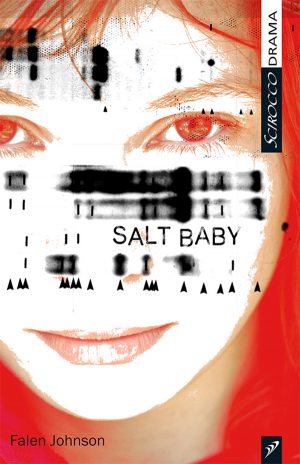 Salt Baby Paperback$15.95
Salt Baby Paperback$15.95
Growing up on the Six Nations native reserve, Salt Baby never quite fit in as a “white” looking “Indian” – fair skin and curly hair made her more of a Shirley Temple type than a Pocahontas type. Salt Baby navigates the native reserve and the city while explaining herself, as well as her blood quantrum, to the world and to “Alligator”: “It’s always different for Indians.”
-
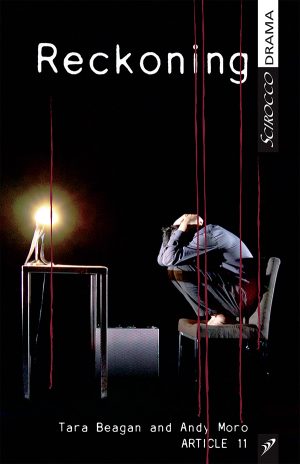 Reckoning Paperback$15.95
Reckoning Paperback$15.95
Reckoning by Tara Beagan and Andy Moro, Article 11 Theatre
Reckoning is a triptych of three short plays: Witness is a dance-movement piece featuring a Truth and Reconciliation Commissioner who unravels as he confronts the brutal testimony of residential school survivors. In Daughter, the daughter of a teacher who was accused of rape seduces her father’s accuser. And Survivor is a virtuoso solo piece about a man preparing to commit suicide as a protest against the insufficiencies of the reconciliation process.
-
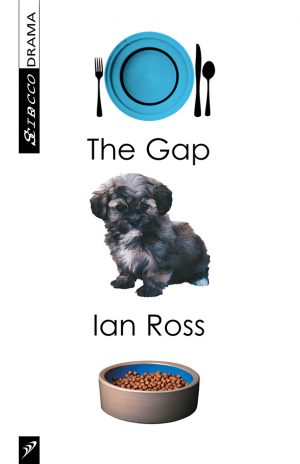 The Gap$14.95
The Gap$14.95
Governor General Award-winning playwright (fareWel) Ian Ross is back with an engaging drama that breaks new ground in his ever-expanding exploration of relationships. Evan and Dawn are getting to know each other; as a young Native man, Evan is unsure of how to approach dating a “middle-class” white woman. The “gap” he perceives, real or otherwise, between his culture, his politics, and his lifestyle, and Dawn’s, continues to widen, preventing them both from moving forward. The two young lovers struggle not so much to keep the balance as to find it.
-
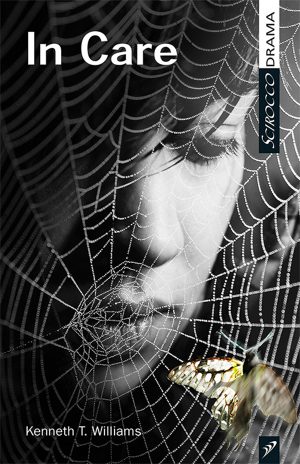 In Care Paperback$15.95
In Care Paperback$15.95
In Care by Kenneth T. Williams
In Care is about a mother’s quest to get her children out of foster care. Janice Fisher has not had an easy life. She worked the streets as a teenager, was addicted to cocaine, and had her first daughter taken from her when she was just 15. But she’s since turned her life around, and is a good mother to three happy girls — until a false accusation gets them apprehended by foster care. Now, Janice is trapped in the system like a butterfly in a spider’s web: the more she struggles to get out the more stuck she gets.
In Care is both an indictment of the racism that’s inherent in our system and a tribute to the strength people as disadvantaged as Janice must have in order to survive.
-
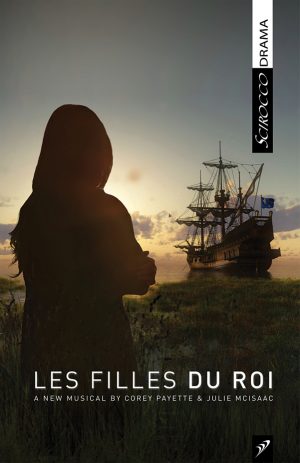 Les Filles du Roi Paperback$15.95
Les Filles du Roi Paperback$15.95
Les Filles du Roi by Corey Payette and Julie McIsaac
Les Filles du Roi (The King’s Daughters), a gorgeous new trilingual musical written in English, French, and Kanien´kéha (Mohawk), is the powerful story of Kateri, a young Kanien´kehá:ka girl, and her brother Jean-Baptiste, whose lives are disrupted upon the arrival of les filles due roi in 1665. They forge an unlikely relationship with young fille Marie-Jeanne Lespérance, whose dreams of a new life are more complicated than she could have imagined. Over the course of a year, Kanien´kehá:ka, French and English journeys collide, setting the stage for the Canada we know today. Payette’s music connects the heartbeat of the drum and the soaring voices of our female ancestors in a thrilling contemporary score, weaving three languages and rivalling the beauty of Canada’s most stunning landscapes.
This Christmas season, things have gone awry for the kohkoms of Kiwetinohk. Clare Bear is engaged to be married, Zula Merasty is moving off-reserve and Sihkos Sinclare is in jail. It all comes to fruition at Clare’s stagette.
-
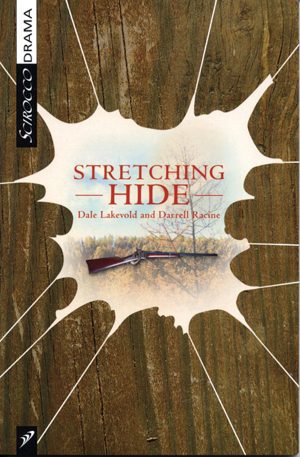 Stretching Hide$14.95
Stretching Hide$14.95
Stretching Hide by Dale Lakevold and Darrell Racine
The Willows, Saskatchewan: Frank, a young Métis lawyer, introduces his fiancé to the idyllic life of his community one July long weekend. That weekend his law practice and his personal life are threatened when the provincial game wardens accuse him of poaching a deer. Stretching Hide heads to the country to present a portrait of a community not often seen on Canadian stages or written into the official histories of Canada—the Métis Nation.
-
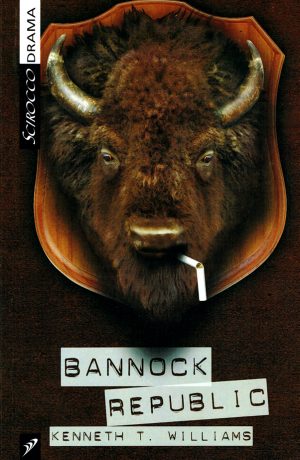 Bannock Republic$14.95
Bannock Republic$14.95
Bannock Republic by Kenneth T. Williams
Find out what yoga, residential schools and the missing thirteenth floors have in common in the new comedy by Kenneth T. Williams. Bannock Republic reunites the cousins Jacob and Isaac Thunderchild 10 years after the mayhem of Thunderstick. This time, a beautiful and vengeful third-party manager will wreak havoc with their lives. Jacob is working as a video journalist and barely clinging to his sobriety. Isaac is now chief of their reserve and trying to get the band out of debt. Destiny Charles, appointed to take over the band’s finances, will make Jacob and Isaac realize that some secrets are better left buried.
-
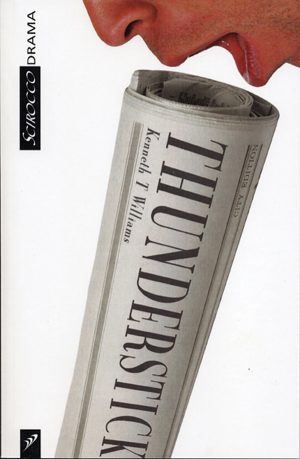 Thunderstick$14.95
Thunderstick$14.95
Thunderstick by Kenneth T. Williams
Jacob is an alcoholic reporter, his estranged cousin Isaac is a worldly photojournalist just recently returned to Canada—and their editor pairs them up to cover a story on Parliament Hill. The problems start when Jacob vomits onto the Prime Minister, an act which is mistaken for an assassination attempt. While in jail, the cousins get information which sends them on a madcap romp to try to track down what might be the story of their lives, involving a government coverup, an international fugitive and a lesbian love nest in the Northern Ontario woods.
When their car breaks down, stranding them in the woods in the middle of the night, Jacob and Isaac finally face up to their painful shared past, and come to terms with what has divided them for all these years.
-
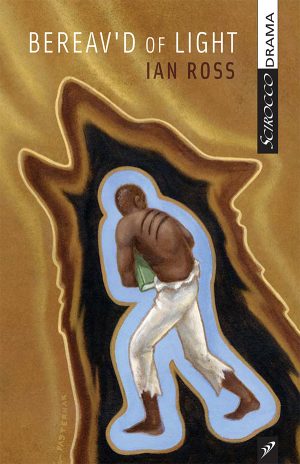 Bereav’d of Light$12.95
Bereav’d of Light$12.95
Wagoosh has a vision and follows the signs south. Absalom, an escaped house slave, is running north on a strange and desperate flight from Abraham, the plantation owner. When the two meet, the inevitable clash of cultures leads us into little explored historical territory. Red, black, and white, eventually the men must come to grips with the things that unite them as well as those that divide them. With humour, music, and poetry, Governor General’s Award-winner Ian Ross paints a compelling picture of the complex nature of race relations in 19th-century America.
-
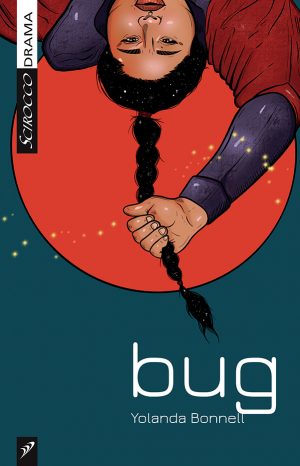 bug$9.99 – $15.95
bug$9.99 – $15.95
bug is a solo performance and artistic ceremony that highlights the ongoing effects of colonialism and intergenerational trauma experienced by Indigenous women. It is also a testimony to the women’s resilience and strength. The Girl traces her life from surviving the foster care system to her struggles with addictions. She fights, hoping to break the cycle in order to give her daughter a different life than the one she had. The Mother sits in Alcoholics Anonymous meetings, recounting memories of the daughter that was taken from her, and the struggles of living on the streets in Northern Ontario. They are both followed by Manidoons, a physical manifestation of the trauma and addictions that crawl across generations. bug reveals the hard truths that many Indigenous women face as they carve out a space to survive in contemporary Canada, while holding on to so much hope.
Or try these non-fiction titles:
Joe from Winnipeg is an acclaimed series of weekly commentaries penned and performed by Ian Ross (winner of the 1997 Governor General’s Award for Drama) on CBC Radio One. Phenomenally successful since they began to air, these humorous commentaries reflect a compassionate and curious Everyman. In his third collection of the Joe from Winnipeg stories, Ross picks over 80 of his faves from the series. He delves into such pressing social issues as moose on the road, immunization, peekaboo, little dogs wearing nail polish, springrolls, and odometer checks.
Off the Ropes by Roland Vandal
Having been sexually abused by a boxing coach as a teen, and not knowing who to trust or tell, Roland Vandal found solace in drugs and alcohol. His battle with addiction, and his unwillingness to speak of his demons, led to failed relationships, bad choices, crime, trouble with the law, and PTSD. After a night of partying with friends in 2001, Roland found himself alone in a Winnipeg hotel and attempted suicide. When he woke plagued by guilt and shame at what he had done, he knew he had hit bottom. He dialled the phone and sought help. Clean and sober for over a decade, Roland is now living a life he never dreamed possible. Filled with moments of humour, sorrow, despair, and triumph over adversity, Off the Ropes tells his story in the raw, from the abuse, to his addictions, to his successes in business and as a motivational speaker and advocate.

